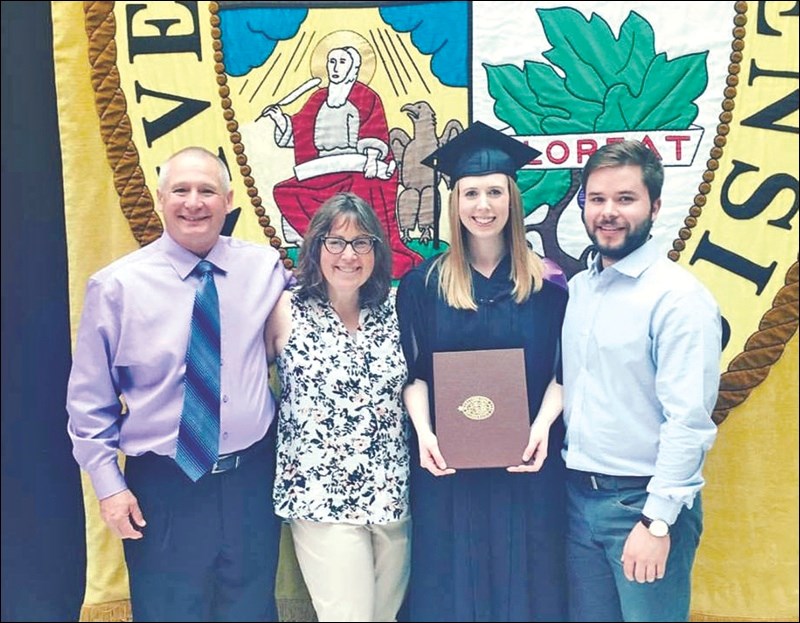As a born and bred Flin Flonner, Dr. Kirsten Clark has seen firsthand a key health-care challenge facing small-town Canada.
Now she’s ready to be part of the solution.
Clark, 25, just graduated from medical school with the goal of practicing in a northern or rural Manitoba community.
“Growing up in that setting really made me aware of the need for physicians in Flin Flon and smaller communities,” she said.
Clark had little interaction with the health-care system herself as a child and teenager growing up in Flin Flon.
The daughter of two teachers, she was an outgoing youth with a passion for sports and the outdoors. When she wasn’t playing soccer or volleyball, she could often be found camping or enjoying nature with friends.
Clark first took an interest in medicine as a grade 9 student at Hapnot Collegiate. She was drawn to the more focused science courses and, given her passion for sports, envisioned entering the field of sports medicine.
She graduated from Hapnot in 2008 at the top of her class, achieving a near-perfect grade 12 academic average. Her scholarships included the prestigious WA Green Bursary from Hudbay as well as an entrance scholarship to Queen’s University in Kingston, Ontario.
That fall Clark began the first of what would be eight consecutive years of post-secondary study. She completed a four-year bachelor of science (honours) in life sciences from Queen’s University in 2012.
What would be next? She had the brains and determination to get into med school, but she was also realistic about the process.
“I was definitely aware that it’s quite competitive and difficult to get in,” said Clark.
She was nonetheless accepted into the University of Manitoba Faculty of Medicine for the fall of 2012. In time her earlier interest in sports medicine gave way to a desire to become a family physician.
“Getting to be able to develop continuity of care with a patient and their family is something that’s really rewarding,” Clark said. “Going through my rotations in medical school, that’s what I found I enjoyed the most.”
She graduated with her MD designation last week, her parents and pharmacology-student fiancé on hand to help celebrate. She was among the youngest of 114 graduates.
Accepting her Doctor of Medicine was “surreal,” Clark said. It also generated “a really great feeling to be done.”
She had spent her first two years at med school in the classroom before branching out into the hospital setting for her third and fourth years.
“In retrospect I really enjoyed medical school,” said Clark. “It’s kind of a grueling four years. There are lots of demands on your time.
“You see a lot of different things. You’re kind of exposed to the health-care system in a way that you weren’t before, so that’s something that’s very eye-opening and very different from perhaps being on the other side of the doctor’s desk. So that was very interesting and at times hard because it’s a lot of firsts. You’re learning about new content, you’re learning about social skills, how to interact with patients. You’re learning a lot of new things all at once, so that can be overwhelming.
“You can go through periods of self-doubt and kind of questioning whether you’re cut out for it, but at the end of the four years the school is really great about supporting you and getting you to the point where you’re confident in your skills and you’re ready to become a physician in your own right.”
Dr. Clark will now begin a two-year family medicine residency program through the University of Manitoba. She will work under the supervision of an attending physician, first in Winnipeg and next year in northern Manitoba and northern Canada.
After that, she will be fully licenced to work independently. She doesn’t know where she will go from there, noting this decision could hinge on where her fiancé is.
Clark’s eventual goal, however, is to practice in a northern or rural Manitoba community. So is her northern hometown a possibility?
“I would definitely consider working in Flin Flon if everything worked out that way,” she said.
Wherever she ends up, Clark is markedly enthused about entering the healing profession.
“The thing that appeals to me the most is being able to have that ability to make a positive impact in other people’s lives,” she said, “and health is such a key component of people’s ability to enjoy life, their ability to go out and do the things they want to do. …It’s something that’s so integral to people and to form that relationship with someone and help them in that way, I don’t think other professions offer that on such a personal level.”




